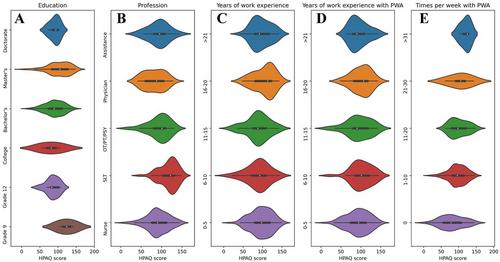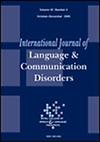Cypriot Healthcare Professionals’ Knowledge and Skills When Interacting With Patients With Aphasia in Clinical Settings
Abstract
Background
Aphasia, a communication disorder mainly resulting from stroke, poses challenges to the meaningful interactions between healthcare professionals and people with aphasia (PWA). Little is known about the knowledge and skills of Cypriot healthcare professionals when interacting with PWA in clinical settings. This study explores the knowledge and skills of Cypriot healthcare professionals in communicating with PWA.
Method
A total of 245 Greek-speaking Cypriot healthcare professionals completed the Greek version of the Health Professionals and Aphasia Questionnaire (HPAQ). Participants’ knowledge and skills were assessed in five categories: Knowledge, Skills, Behaviour and Emotions, Practice, and Environment. Demographic data were analysed through linear regression and ANOVA to identify predictors of HPAQ scores.
Results
Participants’ mean HPAQ score was 94.57 (SD = 28.1). Higher educational levels (master's degree) and the Speech and Language Therapy profession significantly predicted higher HPAQ scores. Moderate frequency of interaction with PWA (1–20 times/week) was also associated with improved knowledge of aphasia and better communication skills when interacting with PWA.
Conclusion
Speech and Language Therapists exhibited higher competency in interacting with PWA compared to other healthcare professionals, highlighting their specialised training. The findings emphasise the importance of education, experience, and interaction frequency in enhancing healthcare professionals' ability to communicate effectively with PWA in clinical settings. To address identified gaps, targeted interventions, such as Communication Partner Training, are recommended to improve communication strategies and patient outcomes in Cypriot healthcare settings.
WHAT THIS PAPER ADDS
- Aphasia, which affects 40% of stroke survivors in the acute phase, profoundly impacts communication abilities, leading to longer hospital stays, increased healthcare needs, and higher rates of disability. Many healthcare professionals lack the training, strategies, and resources required to effectively communicate with people with aphasia (PWA), limiting PWA's participation in decision-making and negatively impacting the quality of care. In Cyprus, there is an urgent need to evaluate and enhance healthcare professionals' competencies in supporting PWA, highlighting the importance of communication training programs in improving care quality and patient outcomes.
- This research highlights the critical need for accessible training programs at all educational levels to ensure equitable standards of stroke care in Cyprus. Moderate interaction with PWA plays a pivotal role in improving healthcare professionals' communication skills, emphasising the importance of balanced and sustainable contact opportunities that foster professional development while minimising the risk of burnout. The findings also reveal that professional experience alone does not enhance communication outcomes unless accompanied by purposeful training and meaningful interaction with PWA. The study underscores the need for targeted communication training for healthcare professionals to improve interdisciplinary collaboration and patient care outcomes.
- The clinical implications are as follows (a) there is a critical need to implement Communication Partner Training programs in Cypriot healthcare settings to address knowledge and skills gaps among non-speech language therapy (SLT) healthcare professionals; (b) communication training programs can create more inclusive clinical environments, enabling PWA to actively participate in healthcare decisions and rehabilitation planning; (c) training interventions should be tailored to different professional groups and educational levels, with introductory-level modules for non-SLT professionals and advanced modules for SLTs; (d) communication training has the potential to improve the quality of care, patient satisfaction, and rehabilitation outcomes for PWA; (e) these actions will provide a basis for developing scalable and targeted communication training solutions to meet diverse healthcare needs in Cyprus.


 求助内容:
求助内容: 应助结果提醒方式:
应助结果提醒方式:


